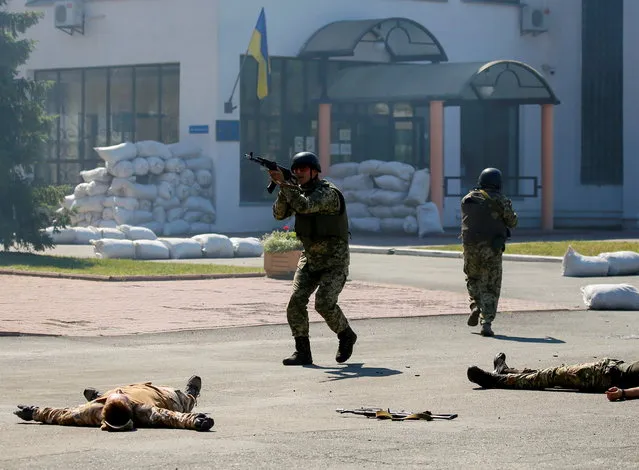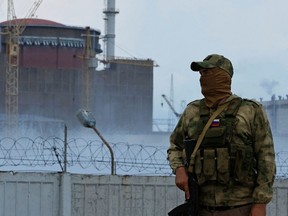UN Chief Calls For International Access To
Ukrainian Nuclear Plant After New Attack
Radio Free Europe
(August 8, 2022) — UN Secretary-General Antonio Guterres has called for international inspectors to be given access to the Zaporizhzhya nuclear plant after Ukraine and Russia traded accusations over the recent shelling of the facility.
Any attack on a nuclear plant “is a suicidal thing,” Guterres told a news conference in Japan.
His comments followed a visit to Hiroshima over the weekend, where Guterres gave a speech to mark the 77th anniversary of the world’s first nuclear bombing.
Petro Kotin, head of Ukraine’s state nuclear power company Enerhoatom, said peacekeepers should be deployed at the Zaporizhzhya site.
“The decision that we demand from the world community and all our partners…is to withdraw the invaders from the territory of the station and create a demilitarized zone on the territory of the station,” Kotin said on Ukrainian television.
“The presence of peacekeepers in this zone and the transfer of control of it to them, and then also control of the station to the Ukrainian side, would resolve this problem.”
The Russia Foreign Ministry said later in a statement that it wanted the International Atomic Energy Agency (IAEA) to visit the plant, but said Kyiv was blocking a potential visit.
Ukraine said renewed Russian shelling on August 6 had damaged three radiation sensors and hurt a worker at the Zaporizhzhya facility, Europe’s largest nuclear power plant. It was the second strike to hit the plant in consecutive days. Russia has claimed that Ukraine is responsible for the strikes.
Ukrainian Prime Minister Dmytro Shmyhal said that he discussed the situation at the power plant with the U.S. Ambassador to Ukraine Bridget Brink, including accusations that Russian forces have planted explosives at the plant to head off an expected Ukrainian counteroffensive in the region.

“The whole world must unite in order to prevent a catastrophe. We count on the support of our partners to stop the aggressor as soon as possible,” said Shmyhal.
Ukraine’s ombudsman, Dmytro Lubinets, likewise urged that the United Nations, the IAEA, and the international community send a delegation to “completely demilitarize the territory” and provide security guarantees to plant employees and the city where the plant is based, Enerhodar.
Ukrainian President Volodymyr Zelenskiy called for new Western sanctions on Russia’s nuclear industry “for creating the threat of a nuclear disaster.”
The plant, about 200 kilometers northwest of the Russian-held port of Mariupol, has been under Russian supervision since Moscow’s troops seized it early in the war, but the Ukrainian staff continues to operate the facility.
The Russian-installed authority of the region said Ukrainian forces hit the site with a multiple-rocket launcher, damaging administrative buildings and an area near a storage facility. The Russian Embassy in Washington also released a statement blaming “Ukrainian nationalists” for the damage.
Kremlin spokesman Dmitry Peskov said on August 8 that the shelling was “extremely dangerous” while calling on Ukraine’s allies “to use their influence to prevent” its continuation.
The fighting at the Zaporizhzhya site has alarmed the world.
Guterres said the International Atomic Energy Agency (IAEA) needed access to the plant.
“We fully support the IAEA in all their efforts in relation to [creating] the conditions of stabilization of the plant,” Guterres said.
IAEA chief Rafael Grossi warned on August 6 that the latest attack “underlines the very real risk of a nuclear disaster.”
Grossi urged all sides in the conflict to exercise the “utmost restraint” near the nuclear site.
The IAEA chief added that it was “of paramount importance” that the agency be allowed access to the plant “to provide technical support for nuclear safety and security.”
With reporting by Reuters and AFP
Atomic Energy Chief Warns of ‘Nuclear Disaster’
A soldier with a Russian flag on his uniform guardz the Zaporizhzhya nuclear power plant.
Radio Free Europe: Ukrainian Service
(August 6, 2022) — The head of the International Atomic Energy Agency (IAEA) expressed grave concerns about the shelling of the massive Zaporizhzhya nuclear power plant in Ukraine, saying it heightens the risk of “nuclear disaster.”
Director-General Rafael Grossi’s comments on August 6 came as Kyiv and Moscow traded blame for the shelling of the Zaporizhzhya site, the largest nuclear power plant in Europe.
“I’m extremely concerned by the shelling yesterday at Europe’s largest nuclear power plant, which underlines the very real risk of a nuclear disaster that could threaten public health and the environment in Ukraine and beyond,” Grossi said in a statement.
Grossi urged all sides in the conflict to exercise the “utmost restraint” near the nuclear site.
The IAEA chief added that it was “of paramount importance” that the agency be given access to the plant “to provide technical support for nuclear safety and security.”
The plant, about 200 kilometers northwest of the Russian-held port of Mariupol, has been under Russian supervision since Moscow’s troops seized it early in the war, but the Ukrainian staff continues to operate the facilities.
On August 5, Ukrainian officials said a high-voltage power line at Zaporizhzhya had been hit by Russian shelling, but they added that the plant was still operating and no radioactive discharges had been detected.
Ukraine’s Energoatom nuclear power company blamed Russian forces for the damage, while Russia’s Defense Ministry accused Ukraine of shelling the site.
Grossi said military action near the plant “is completely unacceptable and must be avoided at all costs.”
“Any military firepower directed at or from the facility would amount to playing with fire, with potentially catastrophic consequences.”
In his nightly video address, Ukrainian President Volodymyr Zelenskiy said Russia must take responsibility for an “act of terror” after Kyiv and Moscow blamed each other for the strikes at Zaporizhzhya.
“Today, the occupiers have created another extremely risky situation for all of Europe: they struck the Zaporizhzhya nuclear power plant twice. Any bombing of this site is a shameless crime, an act of terror,” Zelenskiy said in his nightly video address.
“Russia must take responsibility for the very fact of creating a threat to a nuclear plant,” he said.
Valentyn Reznichenko, the regional governor in Dnipropetrovsk, said that Russian forces the day before shelled a city across the Dnieper Riverfrom the plant.
Military experts quoted in U.S. media reports say they believe Russia is shelling the area intentionally, knowing that Ukrainian forces cannot risk returning fire because it could damage the reactors or disturb nuclear waste sites.
Separately, British military intelligence said Russia’s war in Ukraine is about to enter a new phase, with the heaviest fighting shifting along the Dnieper River to a nearly 350-kilometer front that stretches southwest from near Zaporizhzhya to Kherson.
Grossi urged all sides in the conflict to exercise the “utmost restraint” near the nuclear site.
The IAEA chief added that it was “of paramount importance” that the agency be given access to the plant “to provide technical support for nuclear safety and security.”
The plant, about 200 kilometers northwest of the Russian-held port of Mariupol, has been under Russian supervision since Moscow’s troops seized it early in the war, but the Ukrainian staff continues to operate the facilities.
On August 5, Ukrainian officials said a high-voltage power line at Zaporizhzhya had been hit by Russian shelling, but they added that the plant was still operating and no radioactive discharges had been detected.
Ukraine’s Energoatom nuclear power company blamed Russian forces for the damage, while Russia’s Defense Ministry accused Ukraine of shelling the site.
Grossi said military action near the plant “is completely unacceptable and must be avoided at all costs.”
“Any military firepower directed at or from the facility would amount to playing with fire, with potentially catastrophic consequences.”
In his nightly video address, Ukrainian President Volodymyr Zelenskiy said Russia must take responsibility for an “act of terror” after Kyiv and Moscow blamed each other for the strikes at Zaporizhzhya.
“Today, the occupiers have created another extremely risky situation for all of Europe: they struck the Zaporizhzhya nuclear power plant twice. Any bombing of this site is a shameless crime, an act of terror,” Zelenskiy said in his nightly video address.
“Russia must take responsibility for the very fact of creating a threat to a nuclear plant,” he said.
Valentyn Reznichenko, the regional governor in Dnipropetrovsk, said that Russian forces the day before shelled a city across the Dnieper Riverfrom the plant.
Military experts quoted in U.S. media reports say they believe Russia is shelling the area intentionally, knowing that Ukrainian forces cannot risk returning fire because it could damage the reactors or disturb nuclear waste sites.
Separately, British military intelligence said Russia’s war in Ukraine is about to enter a new phase, with the heaviest fighting shifting along the Dnieper River to a nearly 350-kilometer front that stretches southwest from near Zaporizhzhya to Kherson.

Ukrainian Territorial Defence Forces attend military exercises in Kyiv
In the east, Russian forces launched an offensive on Bakhmut and several other cities in Donetsk, the General Staff of the Ukrainian Armed Forces reported on August 6.
“In the Donetsk direction, the enemy is conducting an offensive operation, concentrating its main efforts in the direction of Bakhmut and Avdiyivka. It is utilizing ground attack and army aviation,” the General Staff said on Facebook.
The General Staff said in its morning report that Russian attacks were successfully repulsed in Yakovlivka, Vershyn, Kodem, and Zaitseve.
The reports could not be independently verified.
Britain’s Ministry of Defense said in its daily intelligence bulletin that Russian forces are now almost certainly massing in the south in anticipation of Ukraine’s counteroffensive or in preparation for a possible assault.
With an increase in troop movements and missile fire, more counteroffensives are under way in southern Ukraine. The focus of fighting is expected to shift away from the Donbas to the Kherson and Zaporizhzhya regions.
Institute for the Study of War
British intelligence reported that Russia has been moving long columns of military trucks, tanks, towed artillery, and other weapons away from the Donbas in the east toward the southwest.
Russia has been also moving equipment and personnel into the annexed Crimea from Russian-occupied Melitopol, Berdyansk, Mariupol, and from mainland Russia via the Kerch Bridge.
The extra equipment and personnel, which includes battalion tactical groups that comprise between 800 and 1,000 troops, will “almost certainly be used to support Russian troops in the Kherson region,” British intelligence suggested.
Meanwhile, Ukrainian forces have been countering the enemy’s moves focusing more often on targeting bridges, ammunition depots, and rail links in the southern regions, including the strategically important railroad spur that links Kherson to Crimea, the bulletin said.
Ukrainian forces are almost certainly using “a combination of block, damage, degrade, deny, destroy, and disrupt effects to try to affect Russia’s ability to logistically resupply,” it said.
Ukraine’s southern frontline city of Mykolayiv imposed an unusually long curfew from late August 5 until early on August 8, Vitaliy Kim, the head of the regional military administration, announced on Telegram. Kim said the measure is meant to allow authorities to identify and detain people collaborating with Russia.
Ukraine’s State Security Service (SBU) said it detained two men suspected of being Russian spies responsible for identifying targets for Russian missile strikes that badly damaged ship-building infrastructure in the port city.
The men “collected and transmitted intelligence to the enemy about important infrastructure facilities, fuel depots, the deployment and movement of personnel and equipment of [Ukrainian) armed forces,” the SBU said.
The agency said without specifying the timing that several ship-building operations and fuel depots were damaged.
With reporting by Reuters, dpa, AFP, and AP.
Posted in accordance with Title 17, Section 107, US Code, for noncommercial, educational purposes
